Stay in the know on all smart updates of your favorite topics.
🚀 Maak je bedrijf toekomstbestendig met de Circulaire Kansenkaart Noord-Holland! 🌍
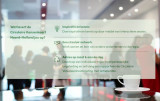
Wil jij als mkb-ondernemer concrete stappen zetten naar een circulaire bedrijfsvoering? Provincie Noord-Holland en Circulair West bieden samen met Route Circulair een GRATIS traject aan voor maximaal 10 bedrijven.
✅ Praktische tools en begeleiding
✅ Inspiratie en kennis via interactieve sessies
✅ Netwerken met andere ondernemers
✅ Persoonlijk advies en actieplan
#aanmelden? Lees verder in dit artikel: https://lnkd.in/eRA5qvAN
PARK27 voor circulaire economie zoekt pioniers!
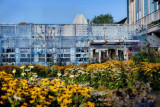
Op Marineterrein Amsterdam transformeert gebouw 027 tot een levend laboratorium. Bureau Marineterrein en gemeente Amsterdam werken samen aan een plan om van deze locatie een bijzondere plek te maken voor creativiteit, circulaire economie en ondernemerschap. Wil jij hier onderdeel van zijn? Dan horen wij graag jouw ideeën!
Binnen PARK27 bouwen organisaties, collectieven, initiatieven en Amsterdammers aan een nieuwe, sociaal rechtvaardige economie binnen ecologische grenzen. In het hart van innovatiedistrict Marineterrein vormt het een ideale omgeving voor experiment en samenwerking.
Voor de invulling van het verdere proces, benodigde ruimtelijke ingrepen en het beschikbaar maken van financiële middelen, vragen we input van partijen die een rol voor zichzelf zien binnen PARK27.
De locatie is 1000 m², is flexibel in te richten en bestaat uit een lobby met sanitaire voorzieningen, drie ruim opgezette werkplekken en een enorme loods in het midden van het gebouw. Ideaal voor een creatieve invulling zoals werk- en maakplekken, een expositieruimte, evenementenlocatie, samenwerking of andere creatieve en innovatieve concepten. De ruimte is minimaal 5 jaar beschikbaar.
Kijk voor meer informatie over PARK27 en de aanmeldprocedure hier: https://lnkd.in/e3ZEbZTB
Curious about... Taking back society

Power to the people? Jazeker! Actief burgerschap, gemeenschapszin – het is helemaal in. Mensen zijn toe aan verandering en willen een stem hebben in de dingen die belangrijk voor ze zijn. De grote uitdagingen van onze tijd vragen om grote oplossingen en daar willen we onderdeel van zijn. Meer en meer krijgen we dat samen voor elkaar, buiten de gebaande paden, in vernieuwende organisatievormen, of op eigen initiatief – niet langer aan de zijlijn, maar midden in het speelveld. Van samen je eigen droomwoning maken tot het testen van ons collectief vermogen om te delen.
Ontmoet de doeners en makers die de maatschappij terugpakken om de wereld vooruit te helpen. Op 29 januari organiseren A Lab en Vandejong de 5e editie van Curious about... We duiken in nieuwe organisatievormen, nieuwe woonvormen, nieuwe zorgvormen en nieuwe natuur. Er zijn succesverhalen en hobbels op de weg. We ontrafelen hoe geld onze samenleving beïnvloedt, krijgen inzicht en handvatten om onze idealen te verwezenlijken, we leren hoe een initiatief niet wordt overgenomen door kapitaal en hoe niks zorgt voor meer... Bekijk het volledige programma en meld je gratis aan op a-lab.nl.
Just.City.Amsterdam.2024

Op 21 november 2024 vindt de tweede editie van Just.City.Amsterdam plaats. Dit jaar richten we ons op een belangrijk thema: rechtvaardigheid in de praktijk brengen. Waar we tijdens de eerste editie verschillende perspectieven op rechtvaardigheid onderzochten, gaan we nu aan de slag met de vraag: Hoe doen we dat?
Wat kun je verwachten?
Vanuit het A Lab in Amsterdam Noord gaan we de wijk in om rechtvaardigheid van dichtbij te ervaren. Samen bezoeken we lokale initiatieven die actief werken aan meer rechtvaardigheid. We kijken naar wat er gebeurt, wat werkt, en wat misschien anders kan. Daarnaast denken we samen na over wat jij zelf kunt bijdragen aan een rechtvaardige stad.
Tijdens Just.City.Amsterdam.2024 ervaar je hoe rechtvaardigheid in de stad wordt toegepast. Sluit je aan bij één van de excursies waarin lokale gemeenschappen hun projecten en uitdagingen delen, en leer meer over hun inzet voor rechtvaardigheid en verandering. Of kies voor een workshop waarin je dieper ingaat op hoe creatieve en praktische methodes bijdragen aan een eerlijker Amsterdam.
Bekijk het aanbod hieronder, meld je aan en doe mee aan het gesprek over een rechtvaardige stad!
- Excursie: Inkijkjes in de Energietransitie - met Tessa Steenkamp
- Workshop: School voor Strijders - met Massih Hutak
- Excursie: Red Amsterdam Noord - met Eva Bollen en Esmee Barel
- Workshop: De maatschappelijke impact van documentaires - met Ester Gould
- Excursie: De Rechtvaardige Stad en Community Wealth Building - met Floris Bremen
- Excursie: Van wie en voor wie is de buurt - Met Bart Stuart
Coliving Conference 2024

The premier conference accelerating the future of shared living.
Join forces with industry leaders, fuel innovation and exchange coliving expertise at the annual 2-day hybrid conference in Amsterdam.
Join us in Amsterdam on 25 & 26 September 2024 for the Coliving Conference, an immersive two-day event powered by Coliving Ventures. In celebration of its second edition, connect with coliving and shared living enthusiasts, forward-thinking entrepreneurs, seasoned investors, and esteemed industry leaders as we continue to shape the future of shared living.
Gain exclusive insights, forge valuable connections and ignite your passion for shared living in a collaborative environment. Immerse yourself in interactive sessions, product showcases and panel discussions while experiencing the vibrant city of Amsterdam.
Don't miss this opportunity to be part of the growing coliving movement and unlock the true potential of shared living.
You may get your ticket here:
https://www.colivingconference.com/
We offer Student & Academic Staff discounts. For more information email us at: conference@colivingconference.com
Society 5.0 Festival
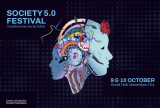
How can we shape the society we want amidst rapid technological advancements? At the Society 5.0 Festival, we believe this demands a radical new way of thinking: a shift from transactions to relations. As creatives, researchers, citizens, technologists, teachers, designers, students, and policymakers, we must actively shape the fabric of our future society. Join us as we listen, nurture, and repair the ties that bind us.
Building local mini-economy within planetary boundaries

Scroll naar beneden voor de Nederlandse versie
Growth is an end in itself, dictates the current economic model. For only growth would keep our economy going and be indispensable to further sustainability. At the same time, our planet is being depleted by this drive for green growth.
Is it time to abandon economic growth as a social ideal? And then what are workable, more social alternatives?
More and more business owners are opting for sustainable operations. They settle for less financial gain to do valuable work with positive social and environmental impact. The rise of the commons movement, housing-, energy- and food cooperatives, as well as social initiatives in health and welfare, show that people want to stand together for values other than financial gain.
Achievable and real alternatives
New economic models offer different perspectives for considering the economy as part of a society. They offer tools to make that economy more equitable and sustainable. Yet the new economic thinking is still often dismissed as unrealistic and unachievable. Only by trying out these theories in practice can we demonstrate that these are real alternatives.
New economic thinking, New economic acting
To experiment with new economic theory and models in practice, the Amsterdam Economic Board has started the New Economic Models exploration. In April, we introduced the living lab project “New Economic Thinking, New Economic Acting” at the Marineterrein in Amsterdam. In this we work on socio-economic experiments, together with AMS Institute, AHK Culture Club, And The People, Bureau Marineterrein, Kennisland, The Next Speaker and the knowledge coalition ‘Art, Tech & Science’.
The Marineterrein is the ideal place to do this because it is an official experiment site. Moreover, companies located here are often already working on circular and social projects. Cultural institutions and organisations at the Marineterrein, in turn, can represent what thriving without economic growth could look like and fuel our desire for a new economy.
-----------------------------------------------------------------------------------------------------------------------
Bouwen aan lokale mini-economie binnen planetaire grenzen
Groei is een doel op zich, dicteert het huidige economische model. Want alleen groei zou onze economie draaiende houden en onmisbaar zijn om verder te verduurzamen. Tegelijkertijd raakt onze planeet uitgeput door die drang naar groene groei.
Wordt het tijd om economische groei als maatschappelijk ideaal los te laten? En wat zijn dan werkbare, socialere alternatieven?
Steeds meer ondernemers kiezen voor een duurzame bedrijfsvoering. Zij nemen genoegen met minder financiële winst om waardevol werk te kunnen doen, met positieve sociale en ecologische impact. De opkomst van de commons-beweging, woon-, energie- en voedselcoöperaties en maatschappelijke initiatieven in zorg en welzijn, laten zien dat mensen zich samen sterk willen maken voor andere waarden dan financieel gewin.
Haalbare en reële alternatieven
Nieuwe economische modellen bieden andere perspectieven om de economie als onderdeel van een samenleving te beschouwen. Ze bieden handvatten om die economie rechtvaardiger en duurzamer in te richten. Toch wordt het nieuwe economisch denken nog vaak weggezet als onrealistisch en niet haalbaar. Alleen door deze theorieën in de praktijk uit te proberen kunnen we aantonen dat dit reële alternatieven zijn.
Nieuw economisch denken, Nieuw economisch doen
Om te kunnen experimenteren met nieuwe economische theorie en modellen in de praktijk, verkent Amsterdam Economic Board deze in de verkenning Nieuwe economische modellen. In april introduceerden we het proeftuinproject ‘Nieuw economisch denken, Nieuw economisch doen’ op het Marineterrein in Amsterdam. Hierin werken we aan sociaaleconomische experimenten, samen met AMS Institute, AHK Culture Club, And The People, Bureau Marineterrein, Kennisland, The Next Speaker en de kenniscoalitie ‘Art, Tech & Science’.
Het Marineterrein is de ideale plek om dit te doen, omdat het een officieel ‘experimentterrein’ is. Bovendien zijn de hier gevestigde bedrijven vaak al bezig met circulaire en sociale projecten. Culturele instellingen en organisaties op het Marineterrein kunnen op hun beurt verbeelden hoe bloei zonder economische groei er uit kan zien en ons verlangen aanwakkeren naar een nieuwe economie.
Powerlunchlezing: Missie first ondernemen? Wordt steward owned!

Meld je aan voor de powerlunchlezing op 10 juni van 11.30 tot 12.30 uur
Ben je op zoek naar een eerlijk een duurzaam bedrijfsmodel voor je onderneming? Vind je dat onze economie toe is aan nieuw eigenaarschap? Heb je altijd al willen weten wat ‘steward ownership’ nou precies is en wat het kan betekenen voor jouw bedrijf? Of misschien wil je er direct mee aan de slag?
Op 10 juni organiseren we van 11.30 tot 12.30 uur een power lunchessie rondom
‘steward ownership’.
Programma
- Steward-owned 'guru' Melanie Rieback van Post-growth Entrepreneurship neemt ons kort mee in het wat en waarom van steward ownership. Hoe draagt het bij aan een betere wereld en de missie van jouw bedrijf?
- Daarna neemt We Are Stewards ons via de ‘How To(ols)’ mee in de praktische stappen om Steward Owned te worden.
Zien we je op 10 juni? Aanmelden doe je door op deze mail reply’en of te mailen naar l.stuijt@amecboard.com. Let's get steward owned!
Nieuw economisch denken. Nieuw economisch doen.
Deze power lunchsessie is onderdeel van het project 'Nieuw economisch denken, nieuw economisch doen' op het Marineterrein. Samen met gebruikers, omwonenden, beleidsmakers en nieuwe-economie-denkers geven we vorm aan een nieuwe economie die handelt binnen de grenzen van de planeet en zijn we op weg naar het Marinterrein als ecologisch stadsparadijs.
Wat: Power Lunchsessie ‘steward ownership’
Waarom: Samen ontdekken van duurzame bedrijfs- en eigendomsmodellen
Waar: AHK Culture Club op het Marineterrein - Gebouw 27K
Wanneer: 10 juni van 11.30 tot 12:30 uur
Wie: alle ondernemers op het Marineterrein: van start- en scaleup tot large corporate😉
Demoday #23 Knowledge Session: An Introduction to Socratic Design
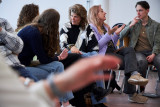
During our 23rd Demo Day on April 18, 2024, Ruben Polderman told us more about the philosophy and method of Socratic Design. It's important for a city to collectively reflect on a good existence. Socratic Design can be a way to think about this together, collectively.
Thinking and Acting Differently with Socratic Design
Together with his colleagues at the Digitalization & Innovation department of the Municipality of Amsterdam, Ruben explored how a city should deal with innovation and digitalization. Things were progressing well. The municipality could act swiftly; for example, promising Smart Mobility research and innovation projects were initiated with new partners. However, the transitions are heading in various directions, and progress remains limited. No matter how groundbreaking innovation is, there's a danger in trying to solve problems with the same mindset that caused them. The ability to perceive or think differently is therefore crucial. More crucial, even, than accumulated knowledge, as filosopher David Bohm suggested.
Through Socratic Design, we can collectively improve the latter. You work on your own presuppositions, enhance your listening skills, and deepen your understanding of our current dominant narratives to create new narratives and practices. Ruben guided us through examples and exercises to help us understand what narratives and presuppositions entail.
Narratives
"We think we live in reality, but we live in a narrative," Ruben proposes to the group. What we say to each other and how we interact creates a culture that shapes the group and its actions. Narratives are stories that guide our culture, values, thoughts, and actions. They are paradigms so deeply rooted that we no longer question them and sometimes believe there is no alternative. Our current dominant narrative has significant consequences for the Earth and humanity, and although it seems fixed, we can also create new narratives together if we choose to do so.
We must fundamentally seek a good existence within safe ecological boundaries. This should go beyond the transitions we are currently favouring, which sustain our lifestyle but just make it less harmful for the environment. If we want to create new stories with new, positive human perceptions and lifestyles, we must first examine our current narrative and presuppositions. We will need to deconstruct our current ways of living and thinking, much like the Theory U method mentioned during the previous Knowledge Session (see our recap article of this session).
Understanding Presuppositions
Ruben showed us various themes and images to collectively practice recognizing presuppositions. For example, a photo of a medical patient and doctors in action demonstrates that our feeling of "to measure is to know" is also crucial in healthcare. The doctors focus on the screen, the graph, the numbers, and therefore have less focus on the patient; the human, themselves. A photo of the stock market, where a group of men is busy trading stocks, also illustrates our idea of economic growth. Here too, there is a fixation on numbers. Ideally, they're green and going up, but meanwhile, we can lose sight of what exactly we're working towards and what exactly it is that we’re ‘growing’.
As a group, we discussed some presuppositions we could find in our field of work. For example, we talked about our need for and appreciation of objective data, and technologism; the belief in solutions rooted in technology and digitalization.
Fundamental Presupposition Shifts and New Narratives
If you flip a presupposition like Technologism and suggest that Social Interaction could be our salvation and solution to many of our problems, you set off a fundamental presupposition shift. If you translate this into practical actions or experiments, you can collectively understand how a newly created presupposition functions. As a group, we worked on this. During this session, I myself worked with an example from the field of mobility.
If I were to apply this new presupposition in the field of mobility and we look at the development of cars, perhaps we shouldn't go towards autonomous vehicles (technologism), but look for ways to motivate and strengthen carpooling (social interaction). As an experiment, you could, for example, set up an alternative to the conventional car lease plan. Employees of an organization don't all get the option to lease a car; instead, it's considered who could commute together, and there's a maximum of 1 car for every 4 employees per organization. Just like going to an away game with your soccer team on Sundays as a kid; enjoyable!
Read More
This session was an introduction and gave us a good initial understanding of this philosophy and method, but there's much more to discover. The method also delves into how presuppositions are deeply rooted in us, how we validate this with feeling in our bodies, and dialogue methods to collectively arrive at new values and narratives. There's more explained about Socratic Design on Amsterdam's Open Research platform.
The global distribution of the 15-minute city idea 5/7
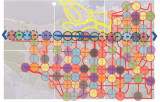
A previous post made it clear that a 15-minute city ideally consists of a 5-minute walking zone, a 15-minute walking zone, also a 5-minute cycling zone and a the 15-minute cycling zone. These three types of neighbourhoods and districts should be developed in conjunction, with employment accessibility also playing an important role.
In the plans for 15-minute cities in many places around the world, these types of zones intertwine, and often it is not even clear which type of zone is meant. In Paris too, I miss clear choices in this regard.
The city of Melbourne aims to give a local lifestyle a dominant place among all residents. Therefore, everyone should live within at most 10 minutes' walking distance to and from all daily amenities. For this reason, it is referred to as a 20-minute city, whereas in most examples of a 15-minute city, such as Paris, it is only about <strong>the round trip</strong>. The policy in Melbourne has received strong support from the health sector, which highlights the negative effects of traffic and air pollution.
In Vancouver, there is talk of a 5-minute city. The idea is for neighbourhoods to become more distinct parts of the city. Each neighbourhood should have several locally owned shops as well as public facilities such as parks, schools, community centres, childcare and libraries. High on the agenda is the push for greater diversity of residents and housing types. Especially in inner-city neighbourhoods, this is accompanied by high densities and high-rise buildings. Confronting this idea with reality yields a pattern of about 120 such geographical units (see map above).
Many other cities picked up the idea of the 15-minute city. Among them: Barcelona, London, Milan, Ottawa, Detroit and Portland. The organisation of world cities C40 (now consisting of 96 cities) elevated the idea to the main policy goal in the post-Covid period.
All these cities advocate a reversal of mainstream urbanisation policies. In recent decades, many billions have been invested in building roads with the aim of improving accessibility. This means increasing the distance you can travel in a given time. As a result, facilities were scaled up and concentrated in increasingly distant places. This in turn led to increased congestion that negated improvements in accessibility. The response was further expansion of the road network. This phenomenon is known as the 'mobility trap' or the Marchetti constant.
Instead of increasing accessibility, the 15-minute city aims to expand the number of urban functions you can access within a certain amount of time. This includes employment opportunities. The possibility of working from home has reduced the relevance of the distance between home and workplace. In contrast, the importance of a pleasant living environment has increased. A modified version of the 15-minute city, the 'walkable city' then throws high hopes. That, among other things, is the subject of my next post.
Supporting Sustainable Technology Education Through E-Waste Recycling
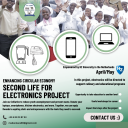
🌍✨ Join Us in Making a Difference! ✨🌍
We're excited to launch a groundbreaking project aimed at transforming e-waste into educational opportunities! 🚀📚 As part of our commitment to sustainability and digital literacy, we're collecting smartphones, laptops, and other electronics to support vibrant educational workshops in Rwanda.
Why join us? By participating, you'll:
- 🌱 Support environmental sustainability by helping reduce e-waste.
- 📖 Contribute to enhancing digital literacy among underserved communities.
- 🤝 Be part of a global movement advocating for responsible technology use.
- 🎓 Help provide essential skills that can transform lives and foster long-term growth.
We're looking for individuals and organizations to donate devices, share expertise, or sponsor our efforts. Every contribution makes a real difference, and together, we can create a more sustainable and inclusive future. 🌟
Let's reshape the future, one device at a time. Join us in this exciting journey and be credited in our upcoming documentary that highlights the collective efforts of our incredible partners from Germany, Latvia, and the Netherlands. 🎥🌍
CONTACT US THROUGH EMAIL - madaralace1999@gmail.com
Highlights from the Intelligent Cities Challenge Implementation Lab

From March 4 to April 5, Amsterdam Smart City (ASC) collaborated with international peers from 77 cities across Europe in a series of online knowledge and inspiration sessions during the Intelligent Cities Challenge (ICC) Implementation Lab. The focus was on sharing best practices and building knowledge for implementing Local Green Deals (LGDs) to accelerate the transformation towards sustainability based on the principles of good governance, policy integration, partnership with local stakeholders.
Colleagues, partners, and experts from the Amsterdam Smart City network shared insights in several thematic and training sessions, including:
• Mobility & Transport Thematic Session: Pelle Menke shared the approach and lessons from ASC's Mobility Justice Challenge, while Diederik Basta introduced the City of Amsterdam's participation in the Gemini project, supporting residents in starting local, shared mobility cooperatives through a "Mobility as a Commons" (MaaC) approach.
• Local Green Deals Training Session: Egon van Wees presented Amsterdam's experience in setting up nine Impact Deals with social enterprises under the CLIMAA Local Green Deals project. The evaluation indicates that these deals have resulted in the creation of 105 jobs for people with barriers to the labor market and a reduction of 92 tonnes of CO2 emissions. Amsterdam, in collaboration with Aalborg (Denmark), also developed a framework now utilized by other cities in setting up similar Impact Deals.
• Social Economy Thematic Session: Frits Verhoef shared lessons from his involvement in two local energy cooperatives, including the pioneering work of NDSM-Energie in developing a 15MW wind park in the NoorderIJplas area, highlighting various financial and political barriers yet to be overcome. Frits also his work with MeerEnergie, a cooperative aiming to establish a heating network owned by local residents in the Watergraafsmeer district of Amsterdam, utilizing waste heat from nearby data centers.
What's Next?
Amsterdam Smart City is excited to host the ICC network in Amsterdam for a Mobility Field Visit in May, showcasing best practices for public-private collaboration in sustainable and smart mobility. We also look forward to connecting with ICC peers in person during the upcoming ICC conference in Porto in June.
More Information
For further details about the Implementation Lab and upcoming ICC activities, visit the ICC website: https://www.intelligentcitieschallenge.eu/events/icc-implementation-lab-1
Stakeholders in the Amsterdam Region interested in more information or wishing to connect to the ICC network during upcoming labs or other similar sessions can reach out to ASC International Liaison via cornelia@amsterdamsmartcity.com
When Business Meets The Amsterdam Donut
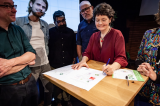
Op 11 april 2024, van 13.30 tot 17.30 uur, nodigen wij jullie uit voor een inspirerende workshop in het hart van Amsterdam! Samen met de Amsterdam Donut Coalitie en Erinch Sahan (Business and Enterprise Lead bij het Doughnut Economics Action Lab) zullen we dieper ingaan op hoe bedrijven kunnen bijdragen aan een duurzamere en rechtvaardigere economie.
In deze workshop zullen we bespreken hoe bedrijven kunnen helpen Amsterdam 'binnen de donut' te brengen, waarbij de behoeften van alle mensen worden vervuld binnen de grenzen van onze planeet. Je zult radicale ideeën ontdekken om jouw organisatie te transformeren en effectieve tools krijgen om deze ideeën in de praktijk te brengen.
De workshop biedt niet alleen waardevolle inzichten en praktische instrumenten, maar ook een kans om deel uit te maken van een netwerk van gelijkgestemde zakelijke pioniers die zich inzetten voor positieve verandering.
Gedurende het evenement zullen deelnemers de kans krijgen om:
- Inzicht te krijgen in de huidige stand van zaken van Donut Economics in Amsterdam, inclusief lopend onderzoek, strategieën en beleid.
- Innovatieve tools en methodologieën te verkennen die zijn ontwikkeld door het Doughnut Economics Action Lab om bedrijven te begeleiden bij het herontwerpen van hun bedrijfsvoering.
- In contact te komen met lokale pioniers en na te denken over hun rol binnen het bredere Amsterdamse ecosysteem.
Door deel te nemen, zullen deelnemers niet alleen waardevolle kennis en praktische vaardigheden opdoen, maar ook deel uitmaken van een netwerk van toegewijde individuen die zich inzetten voor positieve verandering in de zakenwereld.
Dit evenement is ideaal voor professionals uit bedrijven van alle groottes die enthousiast zijn om hun organisaties te transformeren en bij te dragen aan de opbouw van een veerkrachtige en inclusieve economie.
Cursusdag 'Werken aan een lerende organisatie'
Stel je voor: je werkt in een team waarin iedereen actief bijdraagt aan verbeteringen en innovatie. In plaats van weerstand tegen nieuwe werkwijzen, denken je teamleden hierover mee. Werknemers dragen zelf actief ideeën aan om het bedrijf en zichzelf verder te ontwikkelen. Samen breng je de organisatie naar een hoger niveau.
Dat is hoe een lerende organisatie eruitziet. Maar hoe krijg je dat voor elkaar? BouwLab R&Do vertelt je er alles over in de eendaagse training van de Smart Makers Academy. Tijdens de volledig verzorgde cursusdag op 25 april laten we je zien hoe je een lerende organisatie vormgeeft en een leerplan opstelt dat past bij jouw bedrijf. Na deze dag kun je zelfs kiezen voor persoonlijke begeleiding om de implementatie binnen jouw organisatie te versterken.
Wat maakt een lerende organisatie zo belangrijk? Het gaat niet alleen om individuele ontwikkeling, maar om een gedeelde visie waarbij elke medewerker bijdraagt aan de vooruitgang. We gaan, onder leiding van Wilfried Hoffman, dieper in op dit aspect tijdens de cursusdag en leggen uit waarom een lerende organisatie essentieel is voor succes op lange termijn. Met behulp van concrete activiteiten krijg je praktische handvatten aangereikt om zelf aan de slag te gaan.
Deelname aan de cursusdag bedraagt €49,50
De cursusdag duurt van 09:00 tot 17:00 uur.
Cooperative challenge: How can we help to mainstream energy cooperatives and ensure that structures in society make room for them and barriers are resolved?
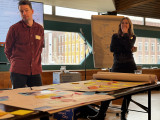
In the past decade, we have witnessed a surge of cooperatives across society. From community-led energy projects to endeavours in collective mobility and housing, citizens and companies are increasingly organizing themselves to shape their surroundings, often driven by sustainability and social goals and most of them do this in a not for profit way. Despite this rich history and the ongoing proliferation of initiatives, cooperative efforts and their benefits often remain small-scale and localized and, in most cases, accessible only to specific and select demographics.
This challenge aims to help civil society organizations in the energy domain, such as energy cooperatives, to become more mainstream. We aim to create recognition, to create an understanding of mutual interests with the key stakeholders they have to work with, and to exchange knowledge for these organizations to grow faster or repeat.
Looking for Coworking Space with other Urban Design/Architecture/Smart City Firms
Hi all!
I'll be joining a small urban design & analytics firm as a contractor soon and am looking for a desk or coworking space that has folks in the same discipline/industry. The rest of my team is based in the US and Spain so I'm looking for a place with a nice community feel :)
Cheers!
Financing- and investment options for the Clean Energy transition.
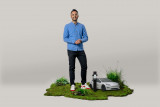
Recognizing the significance of clean tech is pivotal in accelerating the energy transition and shaping a more sustainable future for our planet. However, these solutions are hindered by limited funding options for sustainable companies.
DuurzaamInvesteren.nl is committed to speeding up the sustainability transition by facilitating the right financial solutions for clean energy companies and democratizing investment opportunities. As an alternative investment solution, we connect entrepreneurs with investors and vice versa through our platform.
Founded in 2013, we now are the largest Dutch sustainable investment platform offering alternative finance solutions. We offer guidance, quick turnaround times and flexible terms & conditions and developed a renowned sector expertise in the clean energy transition.
Over the past 10 years we've financed over 335 million euros and we are proud to be a network of more than 17.000 investors. We have helped over 278+ green projects and companies to grow.
Join our webinar to hear more about speeding up the transitions and the opportunities as a sustainable entpreneur or investor.
Details
Date: Tuesday March 26
Time: 7:30-8:30 PM
Duration: 1 hour
Program
- Welcome and opening by CEO Dennis Kromhout van der Meer.
- How DuurzaamInvesteren.nl accelerates the energy transition
- Cases
Marty Smits, founder Refurb battery and Sosimple:
Refurb battery won the Brabant Circular Innovation Award in 2023 and raised 1.15 million euros within 24 hours through DuurzaamInvesteren.nl. Refurb battery supports the energy transition by developing circular battery storage systems and eliminating the increasing amount of li-ion waste.
Marty Smits is also the founder of Sosimple, whose mission is to make clean energy accessible and affordable for everyone and every company in South Africa. SoSimple does this via company roofs throughout South Africa. There are 50 installations live and 15 in development. DuurzaamInvesteren.nl raised more than 5 million for Sosimple.
- How to invest in clean tech energy solutions
- How to raise finance as an entrepreneur via DuurzaamInvesteren.nl
- Q&A Session
Moderation
Ilse Kwaaitaal, director Impact Hub Amsterdam. Impact Hub Amsterdam is part of a worldwide entrepreneurial network that focuses on scaling innovative sustainable solutions through connecting them to finance, knowledge and a valuable growth network.
Note: this event will be in Dutch.
Join our event here: https://lu.ma/kx7gj504
Community Meetup Amsterdam Donut Coalition!
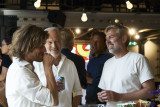
Amsterdam Donut Coalitie Community Meetup!
Op 29 februari organiseert de Amsterdam Donut Coalitie een community meetup in Noord over het voedselvraagstuk.
Voedsel is een essentiële behoefte met aanzienlijke invloed op het milieu. Daarnaast verbindt het gemeenschappen. Daarom organiseren wij een meetup om initiatieven uit Noord, Zuidoost en Nieuw-West samen te brengen en in gesprek te laten gaan.
Op deze bijeenkomst zullen inspirerende initiatieven zoals Tuindorp Delicious, Wortel met Sjeu en Tuinen van Brasa hun inzichten delen over hun aanpak en de rol die de donut economie speelt in de transformatie van voedselsystemen.
Vervolgens gaan we in groepen uiteen om samen het thema voedsel te onderzoeken vanuit de 4 lenzen. Wat gebeurt er als je voedsel bekijkt vanuit een sociaal, ecologisch, lokaal of globaal perspectief?
Dit wordt een waardevolle gelegenheid om te leren, te delen en gezamenlijk na te denken over de toekomst van ons voedselsysteem. Breng je nieuwsgierigheid, ideeën en enthousiasme mee!
🗓️ Datum: Donderdag 29 februari
🕒 Tijd: 16:00-17:30
📍 Locatie: Noord, Tuindorp Delicious, Zonneplein 18a, 1033 EK Amsterdam
Schrijf je hier in: https://forms.gle/jidLbQfjdKbHzNXu9
The 15-minute city: from vague memory to future reality (1/7)
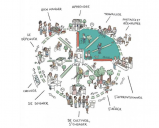
Without changing the transport system in which they operate, the advent of autonomous cars will not significantly improve the quality of life in our cities. This has been discussed in previous contributions. This change includes prioritizing investment in developing high-quality public transport and autonomous minibuses to cover the first and last mile.
However, this is not enough by itself. The need to reduce the distances we travel daily also applies to transporting raw materials and food around the world. This is the subject of a new series of blog posts, and probably the last.
Over the next few weeks I will be discussing the sustainability of the need for people and goods to travel long distances. In many cities, the corona pandemic has been a boost to this idea. Paris is used as an example. But what applies to Paris applies to every city.
When Anne Hidalgo took office as the newly elected mayor in 2016, her first actions were to close the motorway over the Seine quay and build kilometres of cycle paths. Initially, these actions were motivated by environmental concerns. Apparently, there was enough support for these plans to ensure her re-election in 2020. She had understood that measures to limit car traffic would not be enough. That is why she campaigned on the idea of "La Ville du Quart d'Heure", the 15-minute city, also known as the "complete neighbourhood". In essence, the idea is to provide citizens with almost all of their daily needs - employment, housing, amenities, schools, care and recreation - within a 15-minute walk or bike ride of their homes. The idea appealed. The idea of keeping people in their cars was replaced by the more sympathetic, empirical idea of making them redundant.
During pandemics, lockdowns prevent people from leaving their homes or travelling more than one kilometer. For the daily journey to work or school, the tele-works took their place, and the number of (temporary) "pistes á cycler" quickly increased. For many Parisians, the rediscovery of their own neighbourhood was a revelation. They looked up to the parks every day, the neighbourhood shops had more customers, commuters suddenly had much more time and, despite all the worries, the pandemic was in a revival of "village" coziness.
A revival, indeed, because until the 1960s, most of the inhabitants of the countries of Europe, the United States, Canada and Australia did not know that everything they needed on a daily basis was available within walking or cycling distance. It was against this backdrop that the idea of the 15-minute city gained ground in Paris.
We talk about a 15-minute city when neighbourhoods have the following characteristics
- a mix of housing for people of different ages and backgrounds - pedestrians and cyclists
- Pedestrians and cyclists, especially children, can safely use car-free streets.
- Shops within walking distance (up to 400 meters) for all daily needs
- The same goes for a medical center and a primary school.
- There are excellent public transport links;
- Parking is available on the outskirts of the neighbourhood.
- Several businesses and workshops are located in each neighbourhood.
- Neighbourhoods offer different types of meeting places, from parks to cafes and restaurants.
- There are many green and leafy streets in a neighbourhood.
- The population is large enough to support these facilities.
- Citizens have a degree of self-management.
Urban planners have rarely lost sight of these ideas. In many cities, the pandemic has made these vague memories accessible goals, even if they are far from reality.
In the next post, I will reflect on how the idea of the 15-minute city is moving from dream to reality.
Below you can link to my free downloadable e-book: 25 Building blocks to create better streets, neighborhoods and cities
A new challenge: Floating neighbourhoods with AMS Institute and municipality of Amsterdam
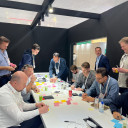
A lot of what we did in Barcelona was about making connections, sharing knowledge, and being inspired. However, we wouldn’t be Amsterdam Smart City if we didn’t give it a bit of our own special flavour. That’s why we decided to take this inspiring opportunity to start a new challenge about floating neighbourhoods together with Anja Reimann (municipality of Amsterdam) and Joke Dufourmont (AMS Institute). The session was hosted at the Microsoft Pavilion.
We are facing many problems right now in the Netherlands. With climate change, flooding and drought are both becoming big problems. We have a big housing shortage and net congestion is becoming a more prominent problem every day. This drove the municipality of Amsterdam and AMS institute to think outside the box when it came to building a new neighbourhood and looking towards all the space we have on the water. Floating neighbourhoods might be the neighbourhoods of the future. In this session, we dived into the challenges and opportunities that this type of neighbourhood can bring.
The session was split up into two parts. The first part was with municipalities and governmental organisations to discuss what a floating neighbourhood would look like. The second part was with entrepreneurs who specialized in mobility to discuss what mobility on and around a floating neighbourhood should look like.
Part one - What should a floating neighbourhood look like?
In this part of the session, we discussed what a floating district should look like:
- What will we do there?
- What will we need there?
- How will we get there?
We discussed by having all the contestants place their answers to these questions on post-its and putting them under the questions. We voted on the post-its to decide what points we found most important.
A few of the answers were:
- One of the key reasons for a person to live in a floating neighbourhood would be to live closer to nature. Making sure that the neighbourhood is in balance with nature is therefore very important.
- We will need space for nature (insects included), modular buildings, and space for living (not just sleeping and working). There need to be recreational spaces, sports fields, theatres and more.
- To get there we would need good infrastructure. If we make a bridge to this neighbourhood should cars be allowed? Or would we prefer foot and bicycle traffic, and, of course, boats? In this group, a carless neighbourhood had the preference, with public boat transfer to travel larger distances.
Part two - How might we organise the mobility system of a floating district?
In the second part of this session, we had a market consultation with mobility experts. We discussed how to organise the mobility system of a floating neighbourhood:
- What are the necessary solutions for achieving this? What are opportunities that are not possible on land and what are the boundaries of what’s possible?
- Which competencies are necessary to achieve this and who has them (which companies)?
- How would we collaborate to achieve this? Is an innovation partnership suitable as a method to work together instead of a public tender? Would you be willing to work with other companies? What business model would work best to collaborate?
We again discussed these questions using the post-it method. After a few minutes of intense writing and putting up post-its we were ready to discuss. There a lot of points so here are only a few of the high lights:
Solutions:
- Local energy: wind, solar, and water energy. There are a lot of opportunities for local energy production on the water because it is often windy, you can generate energy from the water itself, and solar energy is available as well. Battery storage systems are crucial for this.
- Autonomous boats such as the roboat. These can be used for city logistics (parcels) for instance.
- Wireless charging for autonomous ferry’s.
Competencies:
- It should be a pleasant and social place to live in.
- Data needs to be optimized for good city logistics. Shared mobility is a must.
- GPS signal doesn’t work well on water. A solution must be found for this.
- There needs to be a system in place for safety. How would a fire department function on water for instance?
Collaboration:
- Grid operators should be involved. What would the electricity net look like for a floating neighbourhood?
- How do you work together with the mainland? Would you need the mainland or can a floating neighbourhood be self-sufficient?
- We should continue working on this problem on a demo day from Amsterdam Smart City!
A lot more interesting points were raised, and if you are interested in this topic, please reach out to us and get involved. We will continue the conversation around floating neighbourhoods in 2024.
Stay up to date
Get notified about new updates, opportunities or events that match your interests.

